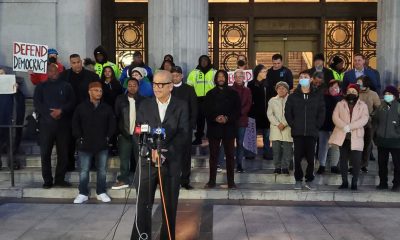Activism
Over 50 Protestors Attend Rally Against New Proposed Homelessness Management Policy

Over 50 people attended a rally against new proposed legislation, called the Encampment Management Policy, outside of Oakland’s City Hall on Oct. 10 from 1:00 p.m. to around 4:00 p.m.
The rally started with speeches in the amphitheater in front of City Hall. Dayton Andrews of The United Front Against Displacement, the group who hosted the rally, spoke first.
“This Encampment Management Policy creates no pathways into housing,” he said. “it merely expands…police authority to [mess] with homeless people.”
Protestors included members of the United Front Against Displacement from the Bay Area, Boston and New York, members of local housing justice groups Bay Area TANC and The Village as well as unhoused Bay Area residents including those who live in the 37MLK community.
Andrews and other speakers stood in front of a boarded up City Hall entrance upon which an unknown source graffitied “OHLONE LAND” and “BLACK LIVES MATTER” last summer and behind two banners trapped across the amphitheater stairs which read “SERVE THE PEOPLE NOT THE RICH” and “THE UNITED FRONT AGAINST DISPLACEMENT” in large black and red letters.
In his speech, Andrews claimed the EMP “codifies and normalizes” the city’s recent and current practice of clearing people who experience homelessness out of an area while offering them no other safe place to live.
On March 27, the City Council unanimously passed a resolution requesting that the City Administration follow CDC guidelines during the COVID-19 pandemic and “only clear homeless encampments if individual housing units or alternative shelter is provided,” but the language used, as a request, has not required the city to do or not do anything.
Although the pace of clearances has slowed during the pandemic, they have still been happening. On Sept. 23, the City demolished structures that had sheltered 20 to 30 homeless people living under the BART rail on 85th Avenue and San Leandro Street in East Oakland and offered them no alternative shelter.
The new Encampment Management Policy, which City Administration formulated, does not provide new services to people experiencing homelessness in Oakland but defines areas that encompass most of Oakland as “high sensitive areas,” then states those areas will be subject to closure.
High sensitivity areas include those within 150 feet of schools, 50 feet or residences, businesses, parks, playgrounds, or sports courts. The City Administration plans to present the EMP to City Council on October 20 where council can approve, outright reject, or engage in a process of changing the policy.
Speakers at the rally did not address reforming the new policy, but some spoke broadly of what they felt all Oakland residents deserve in terms of housing.
“We want decent housing fit for the shelter of human beings,” said activist former Black Panther Frances Moore, widely known as Aunti Frances. She then suggested land and housing should be bought using government aid to be cooperatively owned by Black and oppressed communities who are experiencing homelessness.
Romalita, a resident of the homeless community 37MLK, spoke of how her homelessness is making it impossible for her to get needed surgery. She was critical of those in political positions of power at all levels and emphasized unity amongst activists.
“There’s no one up there who I like, or who’s doing anything for us,” she said. “If we can just stand hand-in-hand together, we can be the power. We are the power.”
After the speeches, protestors marched around City Hall and to the Dept. of Public Works Building, where they laid down a tarp and dumped bags full of trash, a tire, and a couch cushion gathered from a large homeless community in West Oakland.
Before the dumping, Andrews spoke of how homeless people get blamed for trashing areas but are not given consistent trash services by the City and that the places they live become dumping grounds for business and housed residents.
As they dumped trash, protestors chanted “All power to the people.” They picked up the trash before leaving the site.
Activism
Oakland Post: Week of November 26 – December 2, 2025
The printed Weekly Edition of the Oakland Post: Week of November 26 – December 2, 2025

To enlarge your view of this issue, use the slider, magnifying glass icon or full page icon in the lower right corner of the browser window.
Activism
Oakland Post: Week of November 19 – 25, 2025
The printed Weekly Edition of the Oakland Post: Week of November 19 – 25, 2025

To enlarge your view of this issue, use the slider, magnifying glass icon or full page icon in the lower right corner of the browser window.
Activism
IN MEMORIAM: William ‘Bill’ Patterson, 94
Bill devoted his life to public service and education. In 1971, he became the founding director for the Peralta Community College Foundation, he also became an administrator for Oakland Parks and Recreation overseeing 23 recreation centers, the Oakland Zoo, Children’s Fairyland, Lake Merritt, and the Henry J. Kaiser Convention Center.

William “Bill” Patterson, 94, of Little Rock, Arkansas, passed away peacefully on October 21, 2025, at his home in Oakland, CA. He was born on May 19, 1931, to Marie Childress Patterson and William Benjamin Patterson in Little Rock, Arkansas. He graduated from Dunbar High School and traveled to Oakland, California, in 1948. William Patterson graduated from San Francisco State University, earning both graduate and undergraduate degrees. He married Euradell “Dell” Patterson in 1961. Bill lovingly took care of his wife, Dell, until she died in 2020.
Bill devoted his life to public service and education. In 1971, he became the founding director for the Peralta Community College Foundation, he also became an administrator for Oakland Parks and Recreation overseeing 23 recreation centers, the Oakland Zoo, Children’s Fairyland, Lake Merritt, and the Henry J. Kaiser Convention Center.
He served on the boards of Oakland’s Urban Strategies Council, the Oakland Public Ethics Commission, and the Oakland Workforce Development Board.
He was a three-term president of the Oakland branch of the NAACP.
Bill was initiated in the Gamma Alpha chapter of Kappa Alpha Psi Fraternity.
In 1997 Bill was appointed to the East Bay Utility District Board of Directors. William Patterson was the first African American Board President and served the board for 27 years.
Bill’s impact reached far beyond his various important and impactful positions.
Bill mentored politicians, athletes and young people. Among those he mentored and advised are legends Joe Morgan, Bill Russell, Frank Robinson, Curt Flood, and Lionel Wilson to name a few.
He is survived by his son, William David Patterson, and one sister, Sarah Ann Strickland, and a host of other family members and friends.
A celebration of life service will take place at Henry J. Kaiser Convention Center (Calvin Simmons Theater) on November 21, 2025, at 10 AM.
His services are being livestreamed at: https://www.facebook.com/events/1250167107131991/
In lieu of flowers, donations can be made to the Euradell and William Patterson scholarship fund TBA.

-

 Activism3 weeks ago
Activism3 weeks agoOakland Post: Week of November 12 – 18, 2025
-

 Activism4 weeks ago
Activism4 weeks agoOakland Post: Week of November 5 – 11, 2025
-

 Activism2 weeks ago
Activism2 weeks agoIN MEMORIAM: William ‘Bill’ Patterson, 94
-

 Activism3 weeks ago
Activism3 weeks agoHow Charles R. Drew University Navigated More Than $20 Million in Fed Cuts – Still Prioritizing Students and Community Health
-

 #NNPA BlackPress3 weeks ago
#NNPA BlackPress3 weeks agoThe Perfumed Hand of Hypocrisy: Trump Hosted Former Terror Suspect While America Condemns a Muslim Mayor
-

 #NNPA BlackPress3 weeks ago
#NNPA BlackPress3 weeks agoProtecting Pedophiles: The GOP’s Warped Crusade Against Its Own Lies
-

 Bay Area3 weeks ago
Bay Area3 weeks agoNo Justice in the Justice System
-

 #NNPA BlackPress4 weeks ago
#NNPA BlackPress4 weeks ago2026 Subaru Forester Wilderness Review: Everyday SUV With Extra Confidence


























































